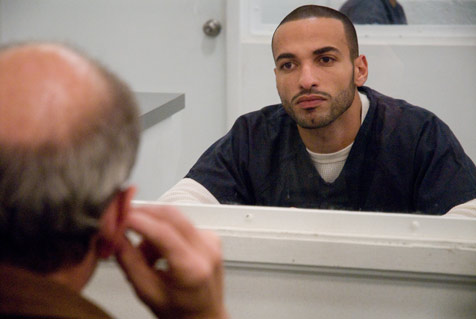A Chat with Haaz Sleiman, Star of Tom McCarthy’s The Visitor
The Immigrant Experience, Post-9/11

When writer/director Tom McCarthy’s The Station Agent came out in 2003, it heralded the arrival of a new talent in the indie film world. The Visitor cements McCarthy’s stature and livens up what’s turning out to be a rather slow spring movie season. Veteran actor Richard Jenkins (Six Feet Under) plays a disillusioned economics professor living in Connecticut who finds an immigrant couple living in his New York City apartment. Though the film centers on the rewarding relationships these seemingly disparate people form, it also subtly examines the immigrant experience in a post-9/11 America. I got the chance to speak with Haaz Sleiman, who plays the immigrant musician Tarek in the film, about the process of bringing the story to life.
What did you think of the script when you first read it? I just fell in love with it. I think what struck me is how : diverse it was in terms of the characters and where they’re from, and how they’re all connected in their own ways. And this film is a reflection of the world that we live in. It’s such a small world now, and we often collide with one another. Because of our differences, it can be devastating and, sometimes, it can be magical. This movie is an example of how magical it can be.
Before filming, the actors got a chance to rehearse for a month. That’s rare. You’re absolutely right. It doesn’t happen often, and it’s almost priceless. I had to learn the drum. I’ve never drummed in my life, so while I was in L.A., I had to drum every day for three hours, three-and-a-half hours, until my hands fell off. So when I went to New York to shoot the film, I had a couple of weeks of rehearsal time and it was almost like getting ready for a play in a way. We sat down every day reading : and a whole other life started to happen aside from the script and the story. : We started to connect in a beautiful way, just the cast, and that life, actually, you see it in the film as well. On top of that, Tom was really generous to allow us to participate creatively, which doesn’t happen often.
In the movie, why do you rehearse the drums without pants on? I ask myself the same question. I’ll actually regret this for the rest of my life-imagine how I felt when my mom saw the movie. I used Nigerian musician Fela Kuti as an inspiration. He was a pop culture icon in Africa, and I rented a doc on him, and in one of the scenes he was smoking a joint and had briefs on while he was rehearsing with his band on stage. I just thought, “Wow, that’s what my character, Tarek, would do. He would rehearse in his underwear.” So I called Tom, and I told him where I got the inspiration and he loved it. He incorporated it, and that’s an example of how he let us participate creatively in the story itself. He then took it and brought it back later with Richard’s character, Walter, which I thought was amazing.
How much did your background help you to understand Tarek’s journey? I’m from Lebanon, and I’ve been exposed a lot to Syria. I used some of my own personal experiences being that I actually moved from Lebanon to Michigan, and then from Michigan to New York, just like Tarek.
Was that a coincidence? That was pure coincidence, and I moved to New York to pursue music as well, singing. So it was just one of those things where you think, “Wow, the planets are aligned.” I was destined to play this part.
The second half of the film takes place in an immigration detention center. Very Kafkaesque. Is the real place the way it is portrayed in the film? Yeah. Tom had personal experience with that before he even wrote the script. He was a visitor, himself. He visited immigration detainees. There’s a program where you actually volunteer and visit detainees that have been there for years and have no one to talk to. He took Richard and me to a real detention center, and we met with a couple detainees, and the detention center you see in the film is an exact replica of the one we visited. It was very helpful for me when we started shooting because I really emotionally connected with the detainees that I met with and spoke with. And I never knew what they went through and how much legal access they had, which is really no legal access whatsoever.
One of the things I loved about this film is it deals with 9/11 and immigration, but it’s not on a soapbox preaching. Tom made it clear, and we knew the film had to be about these people first and not about immigration or policies or anything like that. There was no need for that-the characters were so important in the story. They were more important than anything else and how they connected with one another. So Tarek and Zainab (his girlfriend) could have been legal and it would have been as profound in a way. So it just so happens they were illegal, and the way the story happens is because he was detained. But truly it’s because it’s so character-driven, and they are really the story. And because of that, there was never the need to think, “Oh, we have to be careful not to hit any message over people’s heads,” because Tom wasn’t trying to do that in the story.
4•1•1
The Visitor is currently showing in Santa Barbara theaters.



